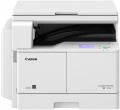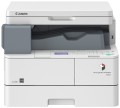Paper size
According to the DIN system, the following print formats are distinguished:
A0 – 841x1189
A1 – 594x841
A2 – 420x594
A3 – 297x420
A4 – 210x297
A5 – 148x210
A6 – 105x148
A7 – 74x105
A8 – 52x74
A9 – 37x52
A10 – 26x37
Usually, most printers support formats up to
A4 –
A3.
First copy time
The time from the document/image is sent for copying till the copier is ready and the first (black and white) page is printed. The faster the first page out, the better.
Double-sided copy
Ability to automatically make
a copy of both sides of the sheet. There is no need to manually turn the sheet. Often used to save paper (for printing documents of little importance) or to make booklets, etc.
Paper supply capacity
The maximum number of pages that can be loaded to the paper supply tray at one time.
Grammage (min)
Standard copiers are designed to print only on light grammage plain paper. The thicker the paper, the more difficult it is to handle with it. Too low paper grammage leads to sheets jamming. Therefore, the greater the difference between the minimum and maximum paper grammage used by the copier, the better.
Black Ink Page Yield
The maximum number of pages that the printer's ink can copy. The value is rather conditional, in fact the deviations from this value are very large (up or down).
More Features
— USB. Universal high-speed port used to connect various peripherals to a PC and other devices. Allows you to connect up to 127 devices per port. The most common and promising connection type for PC.
— LAN. The ability to connect a copier (usually with additional functions of a printer, scanner, fax, etc.) to a PC/multiple PCs via computer network. Suitable for "multi-user environment" — office sharing, etc.
—
Printer. Ability to use the copier as a printer. The device connects to a computer via a wired or wireless interface. In fact, such models are a variant of the MFP, where the copier function is a priority.
—
Scanner. Ability to use the copier as a scanner. The device connects to a computer via a wired or wireless interface. In fact, such models are a variant of the MFP, in which the copier function is a priority.
— Finisher. Allows you to bind the processed copies/printed materials with staples.
— Rotary hammer. The presence of a punching unit allows you to make holes in the processed copies/printed materials for subsequent binding.
— Folding. Possibility of the copier/MFP to fold the processed pages. It is applied to production of various booklets.
Noise level
Measured in decibels. Knowing the level of noise performed by the copier while printing, you can guess whether it will be convenient to use it indoors (for example, a common office room).

